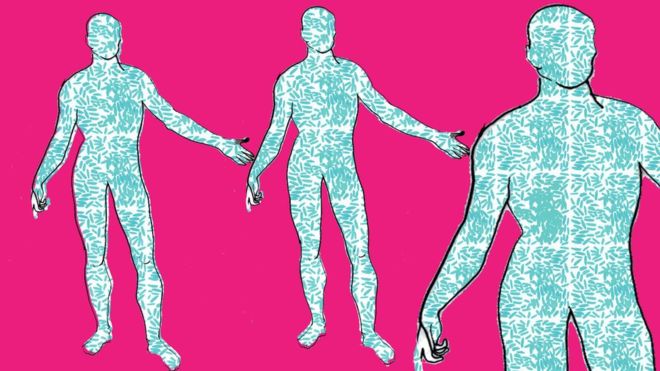 This was a surprise to me — in an article entitled “More than half your body is not human,”
This was a surprise to me — in an article entitled “More than half your body is not human,”
How important are these other cells? “They are essential to your health,” says Prof Ruth Ley, the director of the department of microbiome science at the Max Planck Institute, “your body isn’t just you.”
The first step toward understanding all the implications of having these “microscopic colonists” is to know what they are — bacteria, viruses, fungi and archaea. They are everywhere on your body, with the greatest concentration (as you might have guessed) in the bowels.
And not only are we outnumbered in terms of cells, but there’s an even bigger genomic disparity. The human genome has 20,000 genes; our microbiome’s total gene pool is thought to be somewhere between two and 20 million genes. Or as Prof Sarkis Mazmanian, a microbiologist from Caltech, says: “We don’t have just one genome, the genes of our microbiome present essentially a second genome which augment the activity of our own. What makes us human is, in my opinion, the combination of our own DNA, plus the DNA of our gut microbes.”
Wonderful! So what are the implications? Science is realizing how our microbiomes interact with us in many different ways, like affecting digestion, regulating the immune system, protecting against disease and manufacturing vitamins. This is sparking a whole change in thinking. For example, antibiotics and vaccines have saved many human lives. But what has been their effects on the “good bacteria”? Professor Ley says “We have over the past 50 years done a terrific job of eliminating infectious disease. But we have seen an enormous and terrifying increase in autoimmune disease and in allergy. Where work on the microbiome comes in is seeing how changes in the microbiome, that happened as a result of the success we’ve had fighting pathogens, have now contributed to a whole new set of diseases that we have to deal with.” This set includes obesity, inflammatory bowel disease, Parkinson’s, whether cancer drugs work and even depression and autism.
So perhaps being healthy in the future will mean finding the right combination of bacteria and viruses to tag along with you.
My mother always did tell me you can never have too many friends!
The complete article is at http://www.bbc.com/news/health-43674270?. The illustration came from that site.
